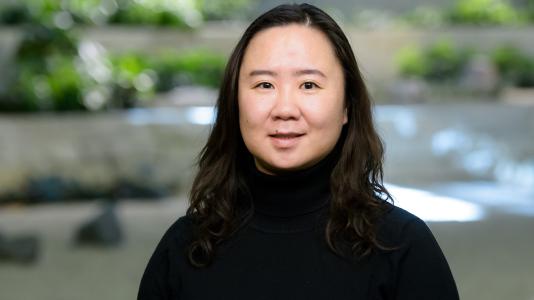
Principal Atmospheric and Climate Scientist, EVS
Education: Ph.D. in Atmospheric Science (University of Michigan Ann Arbor), M.S. in Computer Science (University of Michigan Ann Arbor), B.S. in Atmospheric Science (Peking University)
Hobbies: Hiking, reading, traveling
Yan Feng contributes to important scientific questions impacting the climate, nation, and world in her work as a Principal Atmospheric and Climate Scientist in Argonne National Laboratory’s Environmental Science (EVS) department. Through atmospheric science – in particular the study of clouds and air pollutants in the atmosphere – she helps predict how the world’s climate and weather might change in the future, and how these changes will affect our lives.
When she was young, Yan enjoyed reading books, reflecting that “it was the way for me to get to know the world outside.” In particular, she had a fascination for natural sciences, wanting to learn more about the environment and weather. “So I knew early on that I wanted to study science in college, and Atmospheric Science was my major,” she explained. “Since then, I have not looked back on the path to becoming an atmospheric scientist and climate modeler.”
After graduating from Peking University with a Bachelor of Science in Atmospheric Science, Yan went on to study at the University of Michigan in Ann Arbor, where she earned both an M.S. in Computer Science and a Ph.D. in Atmospheric Science. She now works at Argonne in the EVS department, where she helps develop technology and methods to predict how natural and human-made influences will affect the climate.
Yan takes great pride in her work as an atmospheric scientist, since it has critical relevance in the modern world. “Understanding the essential principles of the Earth’s climate and building the reliable global climate models are vital – for both societal applications and the advancement of science,” she emphasized. She also enjoys continuing to discover new things: “The climate research and impact on the society always challenge me with new questions that motivate me to think, to learn, to find solution, and to ask more questions!”. Those questions range from wildfires, dust storms, ocean wave breaking to urban hazes.
Looking back at her life and STEM journey, Yan encourages students to not just think about their interests and goals for the future, but to also take initiative and act on them. “We generally enjoy doing things that we excel in, but before one gets there, time needs to be invested, and dedication pays off,” she advised. She also added that “if you don’t have specific interests yet, just learn something new – e.g., how to do programming. It will be very useful.”